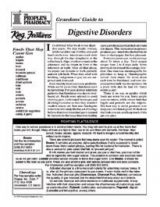
Gastroenterologists are often baffled by irritable bowel syndrome. Irritable bowel symptoms such as abdominal pain, cramping, bloating, gas, diarrhea and/or constipation are very disruptive, but don’t appear to have any objective cause. (Scientists may be closer to finding a cause, however, as we have written here.) This can make it difficult to treat them, although doctors do prescribe medications to relieve the symptoms. Gastroenterologists may refer to this as a “functional” disorder, meaning that the digestive tract doesn’t function properly even though they can’t figure out why.
Treating Irritable Bowel Symptoms by Accident:
Q. I suffered for many years with irritable bowel syndrome (IBS). At my annual physical my cholesterol was a little high, so my doctor put me on fenofibrate to see if that would help. Within a week I no longer had IBS symptoms.
After two years, I still have no IBS. My doctor was surprised but said she would mention it to other doctors.
A. We were a bit surprised too, since we had not heard this before. An online search uncovered a patent application for giving a fibric acid derivative such as fenofibrate to alleviate symptoms of IBS, so evidently others have also had benefit.
Usual Treatments for Irritable Bowel Symptoms:
Fiber:
Fibric acid derivatives are different from the fiber supplements that are usually recommended to help control the constipation or diarrhea that are often present with IBS. Metamucil or Citrucel are the most common products. While psyllium (Metamucil) can help lower cholesterol, the way it does so is somewhat different from fenofibrate or other fibric acid drugs.
Anti-Diarrhea Drugs:
Many people with IBS end up using loperamide (Imodium) to control diarrhea when that is a problem. Some people who suffer from IBS have diarrhea most of the time; others tend more to constipation, and a few alternate back and forth.
Antidepressants:
Doctors may occasionally prescribe an antidepressant to help with the low mood that chronic digestive difficulties may trigger. A tricyclic antidepressant such as amitriptyline (Elavil) or imipramine (Tofranil) can be somewhat constipating in addition to alleviating depression. That obviously would be more helpful for those suffering with diarrhea than those with constipation.
Non-Drug Treatments for Irritable Bowel Symptoms:
Peppermint:
Enteric-coated peppermint oil may be used to relieve irritable bowel symptoms, especially cramping and pain. You can read more about it here. Although this seems like it might be an “old wives’ tale,” there is a certain amount of placebo-controlled research supporting its use.
Coconut:
Many readers report that coconut, as unsweetened flaked coconut or incorporated into coconut macaroon cookies, can calm diarrhea. Read about that approach here.
Be wary of overdoing on sweets, though. Some experts suggest that people with IBS would benefit by avoiding gluten and fermentable foods, which include fructose. Fructose is a component of nearly everything that tastes sweet, so if you decide to follow a low-FODMAPS diet, you’ll need to keep that in mind.



Rope Factory
NYC
As someone who suffered from IBS, on and off, for the last thirty years, I can say, a balanced diet, Famotidine, and Cetirizine helped relieve some of the symptoms (as my IBS was probably allergy-induced), Recently, Fenofibrate was added to my long list of medications. It does promote healthier bowel movements. Hate to be graphic, but Fenofibrate can give you some prize-winning “Lincoln Logs.”
Paul
I have lived with IBS for over 65 years. The only thing which has consistently helped is peppermint oil. (Just ordered two bottles from Swanson last evening!). I’m sure I learned about the peppermint oil from the Peoples Pharmacy so, Joe, thanks again!
Peppermint oil, one capsule at breakfast, has been a significant help but is far from being the cure-all that we all seek. Lactose intolerance seems to be a frequent additional issue for those of us who fight IBS. I have wondered if this seeming linkage might suggest a clue as to finding a lasting fix for IBS. Surely someone somewhere has stumbled on to a lasting fix. If so please share the news.
Ghanim
I have suffered from IBS on and off for nearly 12 years. It’s not easy to live with it because of the pain and how it ruins your mood. I tried many things to try and treat it which only helped quite a bit. However a month ago I did a blood test and discovered I had high cholesterol levels and was prescribed Zocor. Just like that my IBS vanished. At first I was skeptical and kept saying this is too good to be true and this probably is temporary but no IBS symptoms ever since I started. Today I can achieve many things during the day without worrying if my stomach will act up on me. This truly is a miracle for those who suffer from IBS.
Shirley
N.C.
For years I thought I had IBS. I began to search for a cure by eliminating dairy products, except small amounts of yogurt. Then I ate smaller portions at meal time, and little “bites” during the day. No carbonated drinks, no liquor, now and then a glass of wine was okay. Avoided fatty foods, most spicy foods (which I love). Still occasional attacks for no apparent reason.
One day I went to the doctor for a cough and cold symptoms and was given anti biotics and had 3 weeks of diahrrea. I resorted to anti diahhrea nonprescription meds which slowed things down but did not cure.
My daughter suggested probiotics and voila! Cured! I take choleseral meds, blood pressure meds, a multivitamin and vitamin D, exercise regularly and try to get plenty of water and, most importantly, a daily probiotic which has made my life better. There is not much worse than an unexpected and uncontrollable bowel movement when you are out and about. You stop going out to eat, afraid to go shopping or travel, and even worse, find yourself in a car going down a long stretch of road with no facilities available. The humiliation is overwhelming. I have been hospitalized briefly and diagnosed with “Ischemic Colitis” because no cause could be found and yet I was not prescribed probiotics, which are relatively cheap and do not require a prescription.
Linda
buffalo ny
since I had a heart attack and have been put on provastatin and lisinoplril, atenolol,brilinta baby aspirin I have much much less diarhea
Alex
Another very helpful remedy for IBS: digestive enzymes ( in addition to low-FODMAP diet and finding individual food culprits). Try Lactaid FastAct for milk products (some store brands have sugar alcohols, which are FODMAPs). Enzymatic Therapy CompleteGest or Enzymedica Digest are great for overall digestion (take with meals/snacks) . Avoid Beano tablets – has sugar alcohols!
Melinda
San Antonio
I’ve suffered with IBS for decades. I’m diabetic (4 years) and my metformin was interfering with B12 and I became severely deficient. I was instructed to take 1000 mg of B12 (I take methylcobalamin). I’ve been on the B12 for 30 days, and surprisingly, I have not had an episode during these 30 days. Time will tell, but it’s been a surprising find.
Steve
Fort Worth, TX
I had a bad case of diverticulitis and had to go to the hospital for diagnosis. They prescribed some antibiotics and sent me home. A week or more later I was fine. When similar symptoms occurred sometime later I took peppermint oil capsules and the symptoms went away in three days. Now when I sense the first signs of diverticulitis coming on I take the peppermint oil capsules and it will be gone in a day maybe two day. I have been doing this now for 15 years and it always works. Now if I sense any abdominal discomfort I try peppermint oil first. It almost always works.
Pam
TX
I began eating an apple first food of the day. Seems to calm colitis down. Is there any danger
in taking pepto bismol once a day also?
Alex
I had severe IBS for years. Switching to the low-FODMAP diet was extremely helpful. In addition, I found that I have to avoid chocolate, coffee and tea, nuts, oats, and other high fiber grains. The low-FODMAP diet is a great start, especially the recommendation about the types of fruits that have low fructose, spacing out fruit portions, and complete avoidance of all onion and garlic. This means reading labels very carefully and not consuming most prepared foods, which means eating out is a challenge. But it is worth it!
Laura
For years I thought I had IBS, but about five years ago I came across an article concerning diarrhea after gallbladder removal. It fit my situation perfectly. Since there is nowhere for the liver to store the bile it makes (as it used to be stored in the gallbladder), it directly flows into the small intestine 24/7, causing bile salts diarrhea, the condition being called Bile Salts Malabsorption. In the UK this is often treated with cholesterol medications. I am in the US. The article I read suggested calcium carbonate. I know there are negatives associated with calcium, but I take 1/4 of of a tablet after breakfast, 1/2 after lunch, and another 1/4 before bedtime. That is the amount that works for me. The calcium carbonate (in the purple and white bottle) soaks up the excess bile and helps tremendously with the diarrhea.
Jan
NC
Throughout my life I have had episodes of irritable bowel, but after gallbladder removal it was greatly increased. Because I already have higher cholesterol than is desirable and have adverse effects from statins, my doctor prescribed Cholestyramine resin powder (Questran) for daily use. This has been highly successful in moderating the irritable bowel symptoms. I am also anticipating lower cholesterol numbers from this older cholesterol treatment that doesn’t have the negative effects of statins.
Dana
I am 54 years old and have suffered with IBS with constipation since I was about 18. At one point I was on a prescription medication that worked wonders, but it was taken off the markets for cardiac concerns. The next prescription was basically a laxative, which I didn’t want to take. Citricel was recommended, but it didn’t work for me. What DOES work for me though is taking a probiotic every morning, drinking plenty of fluids throughout the day, getting a good amount of cardio exercise, followed by 400 mg of magnesium oxide at bedtime. Works like a charm!
Sharon
Illinois
My doctor prescribed Cholestyramine which is a cholestrol med with the side effect of constipation. It worked wonders on my IBS. A friend who is a doctor recommended that since it is a binding agent it might interfere with other meds if taken at the same time. I also take VSL#3 which is a probiotic that requires refrigeration. These two keep my bowel regular.
Fred
LACTOSE WARNING!!!
Please advise your readers that IMMODIUM in pill form contains anhydrous LACTOSE! I believe the lactose is used to help keep the shape of the pill.
My wife is lactose intolerant. She was using the liquid form successfully. She then used the pill form for convenience but still had problems. I then compared ingredients and found lactose.
The lack of a “lactose warning” on the pill form is simply outrageous, especially for a diarrhea medication!
The liquid form of Immodium uses anhydrous citric acid.
Fred
Still in moderation?????
Kit M
10 years ago I suffered from severe IBS and many other symptoms, such as headaches, depression, restless sleepless nights, body aches, eczema, and more. My doctor tested me for food sensitivities (not allergies) called Toxic Food Syndrome. When I gave up those foods I reacted to, all those symptoms abated AND I lost the 20 lbs I’d been unable to before. It was very difficult to give up food I loved; however, feeling well is definitely worth it. Over the years, when I cheat with those foods, my gut (literally) lets me know.